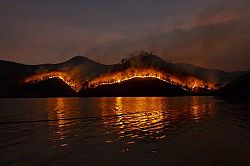

According to the newest report published by the International Panel on Climate Change (IPCC), scientists around the world have documented changes in the climate across the whole globe and many of those changes are happening on an unprecedented scale, not seen in thousands or even hundreds of thousands of years.
In the newly published document, the IPCC discusses estimates on exceeding the 1.5-degree warming of the globe. And the results are striking - the report states that unless a rapid and radical reduction in man-made greenhouse gas emissions is implemented by all governments, very soon irreversible changes to the climate on our planet may happen, which might endanger the life on Earth as it is now. As things stand, the emissions-cutting efforts are not good enough and reaching the maximum 2-degree target of global warming agreed in Paris is impossible to achieve.
This report, which has been in the making for eight years, is the work of hundreds of experts and peer-review studies and represents the world's full knowledge to date of the physical basis of climate change.
The report states that the greenhouse gas emissions caused by human activity to date are currently responsible for 1.1-degree warming and the mean temperature prognosis is that in the next 20 years the elevation of temperature will reach or exceed the 1.5 degrees of warming. This prognosis is based on the improved data collected from observation stations around the world and a better understanding of climate science. The experts have no doubts that climate change is not only happening, but it is accelerating, possibly beyond our control in the near future.
Here are the main conclusions of the report:
The UN secretary-general, Antonio Guterres warned: "[This report] is a code red for humanity. The alarm bells are deafening, and the evidence is irrefutable: greenhouse gas emissions from fossil fuel burning and deforestation are choking our planet and putting billions of people at immediate risk."
The Prime minister, Boris Johnson said about the report: "Today's report makes for sobering reading, and it is clear that the next decade is going to be pivotal to securing the future of our planet.
"I hope today's report will be a wake-up call for the world to take action now, before we meet in Glasgow in November for the critical COP26 summit."
Today's report follows last week's scientific warning about the already observed early signs of Gulf Stream collapse, which is one of the tipping points for the climate.